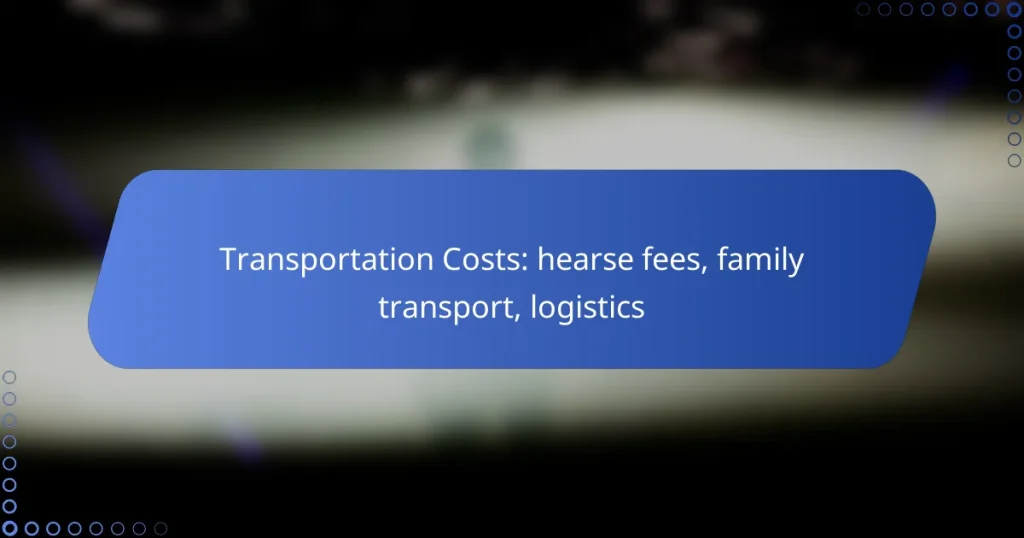Transportation costs play a crucial role in funeral planning, with hearse fees in Canada typically ranging from CAD 300 to CAD 1,000, influenced by rental duration and additional services. Family transport expenses can vary between CAD 300 and CAD 1,500, depending on distance and specific needs. Understanding these logistics is essential for families to ensure all arrangements are effectively managed during a difficult time.
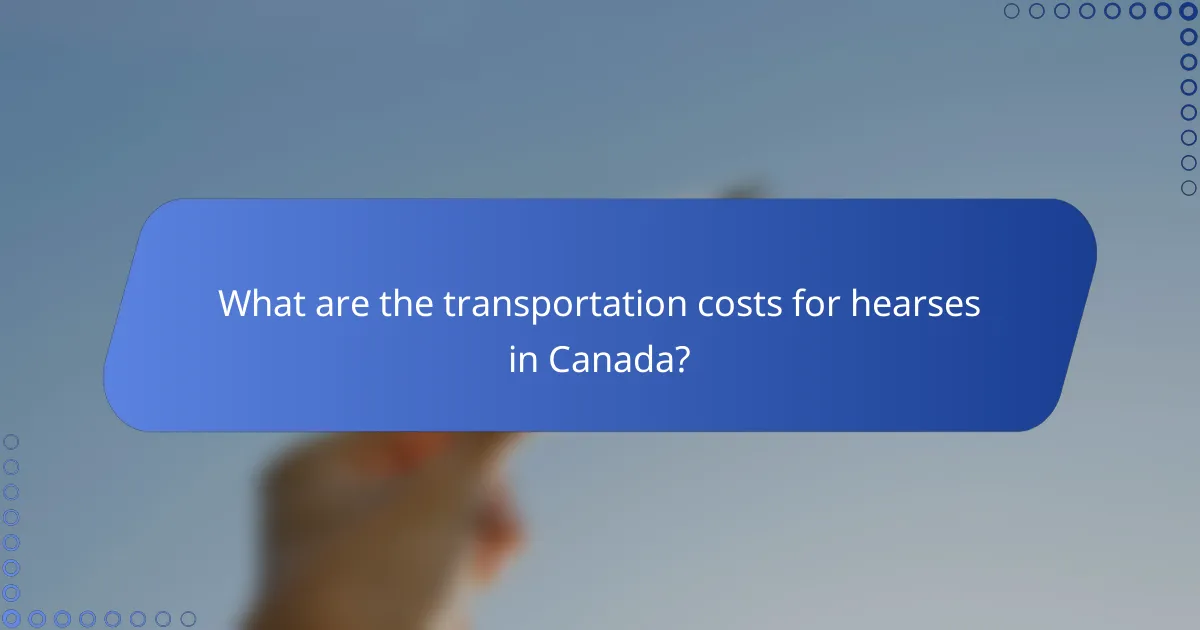
What are the transportation costs for hearses in Canada?
Transportation costs for hearses in Canada typically range from CAD 300 to CAD 1,000, depending on various factors such as rental duration and additional services. Families should consider these costs when planning funeral logistics to ensure all necessary arrangements are covered.
Average hearse rental fees
The average hearse rental fee in Canada usually falls between CAD 400 and CAD 800 for a standard service. This fee often includes the vehicle for a few hours, typically covering the transportation from the funeral home to the burial site or crematorium.
Additional charges may apply for extended use, such as transportation to multiple locations or overnight rentals. Families should confirm what is included in the rental fee to avoid unexpected costs.
Factors affecting hearse costs
Geographic location also plays a role; urban areas may have higher rental prices compared to rural regions. It’s advisable to compare quotes from multiple funeral service providers to find the best option.
Regional pricing variations
In Canada, hearse rental prices can vary significantly by region. For instance, major cities like Toronto or Vancouver may see higher fees, often exceeding CAD 1,000, while smaller towns may offer rentals starting around CAD 300.
Understanding these regional differences can help families budget more effectively. It’s beneficial to research local funeral homes and their pricing structures to get a clearer picture of expected costs in specific areas.
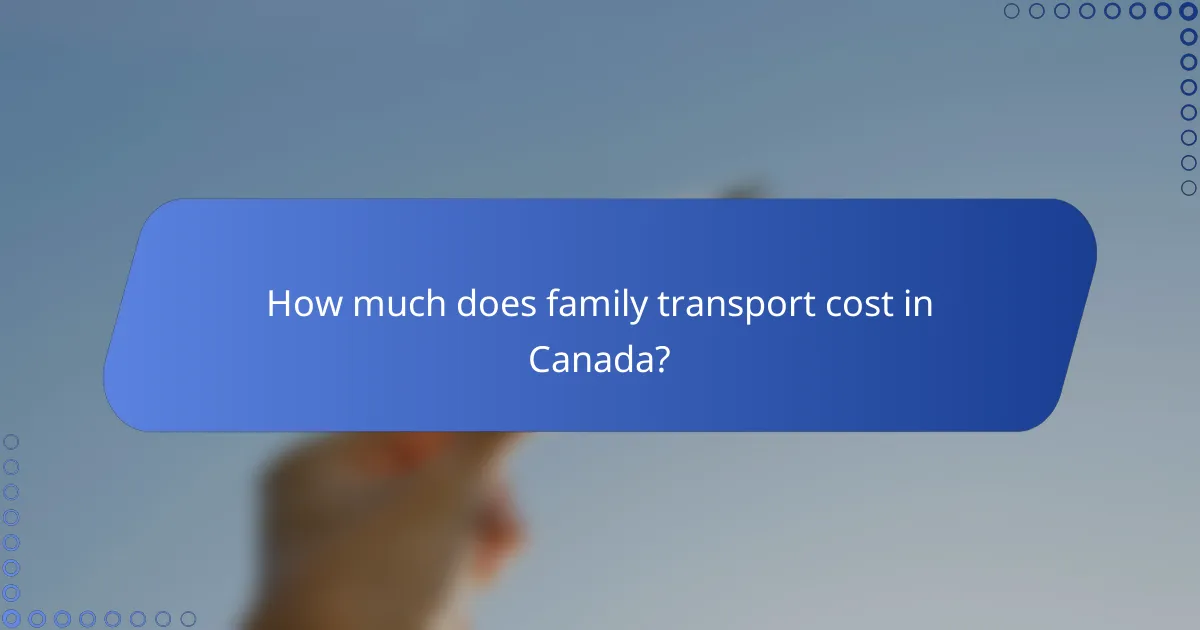
How much does family transport cost in Canada?
Family transport costs in Canada typically range from CAD 300 to CAD 1,500, depending on the distance, type of service, and specific requirements. Factors such as the number of passengers and the duration of the transport can also influence the overall price.
Typical family transport fees
In Canada, typical family transport fees can vary significantly based on the service provider and the distance traveled. For local transfers, costs may start around CAD 300, while longer distances can push fees to CAD 1,000 or more. Additional charges may apply for extra stops or specialized services.
It’s advisable to request quotes from multiple providers to get a clearer picture of potential costs. Some companies may offer package deals that include additional services, which can be more economical.
Services included in family transport
Family transport services often include vehicle rental, a professional driver, and basic amenities such as water and comfort items. Some providers may also offer additional services like floral arrangements, transportation for pets, or assistance with luggage.
When selecting a service, consider what is included in the fee. Ensure that any special requests or needs are clearly communicated to avoid unexpected charges.
Comparison of transport providers
When comparing transport providers in Canada, look for key factors such as pricing, service quality, and customer reviews. Online platforms can provide insights into the experiences of other families, helping you make an informed decision.
Additionally, check if the provider has experience with family transport specifically, as this can impact the level of service and attention to detail. Don’t hesitate to ask for references or testimonials to gauge reliability.
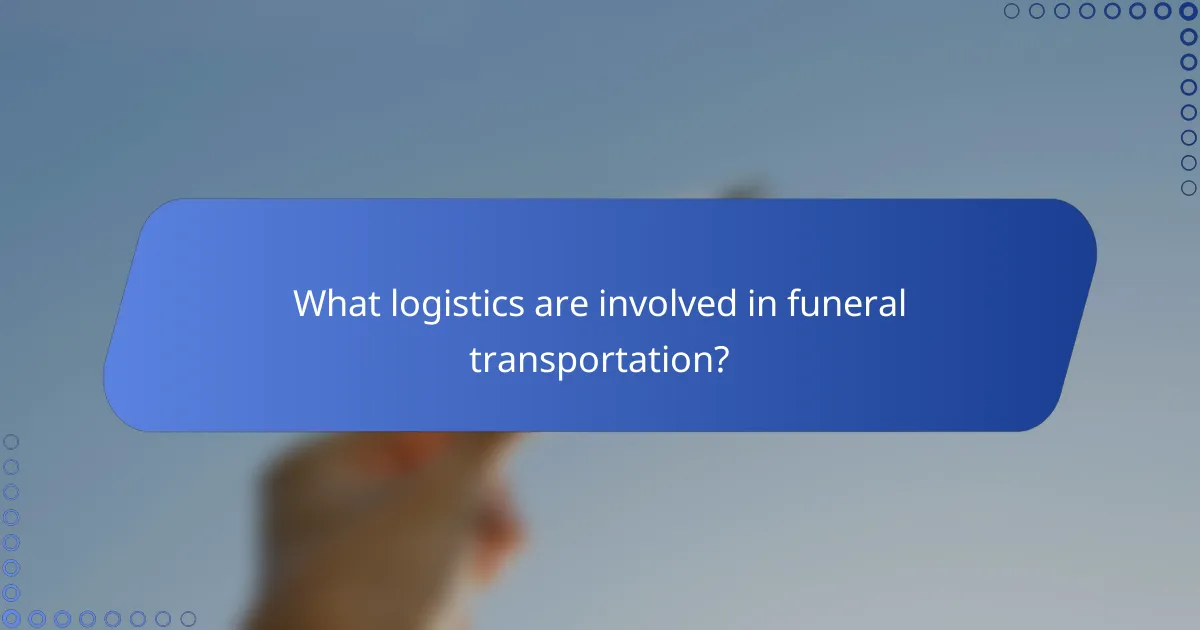
What logistics are involved in funeral transportation?
Funeral transportation logistics encompass the planning and execution of moving the deceased, family members, and necessary equipment. This process includes coordinating hearse services, family transport, and ensuring timely arrivals at various locations such as the funeral home, cemetery, or memorial service venue.
Key logistics considerations
When planning funeral transportation, consider the distance between locations, the type of vehicles required, and the number of passengers. Hearse fees can vary significantly based on the service provider and distance traveled, typically ranging from a few hundred to over a thousand USD.
Additionally, ensure that all necessary permits and documentation are in order, especially if the deceased is being transported across state lines. Understanding local regulations can prevent delays and complications during the process.
Common logistics providers
Funeral homes often provide comprehensive transportation services, including hearses and family vehicles. Many also partner with local transportation companies to offer additional options, such as shuttle services for larger groups.
Independent logistics providers may specialize in funeral transportation, offering competitive pricing and flexible scheduling. It’s advisable to compare services and read reviews to find a reputable provider that meets your needs.
Scheduling and coordination tips
Effective scheduling is crucial for smooth funeral transportation. Start by creating a timeline that includes all key events, such as viewings, services, and burial. Allow for extra time between events to accommodate any unforeseen delays.
Communicate clearly with all parties involved, including family members, funeral directors, and transportation providers. A shared itinerary can help everyone stay informed and ensure that all logistics are handled efficiently.
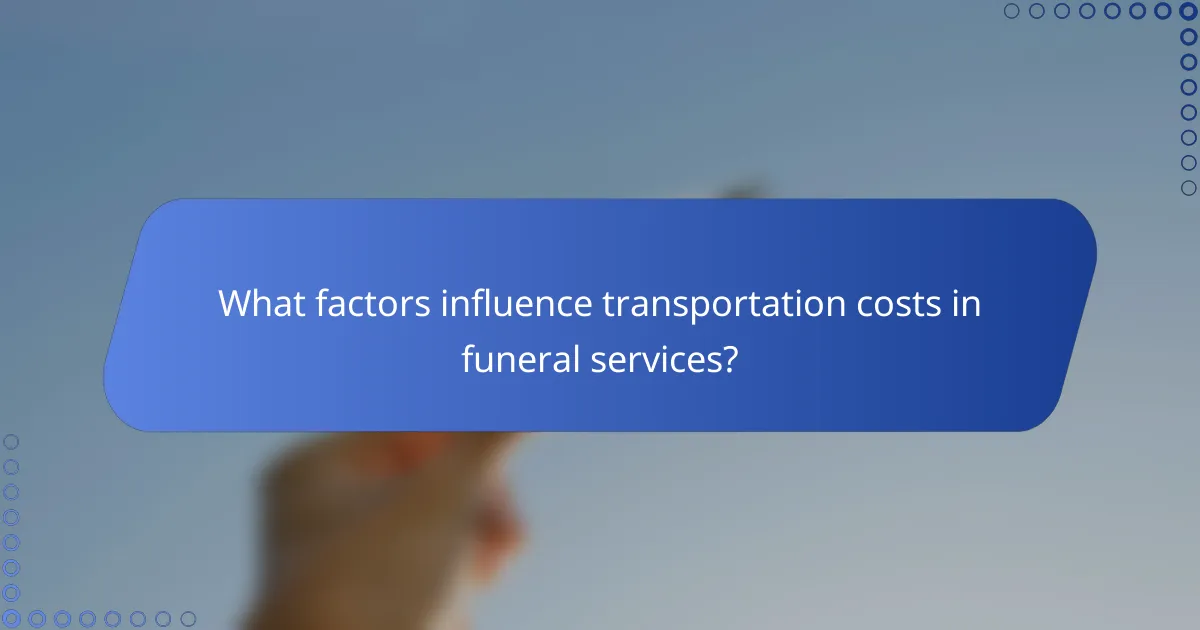
What factors influence transportation costs in funeral services?
Transportation costs in funeral services are primarily influenced by distance, the type of service selected, and seasonal pricing trends. Understanding these factors can help families make informed decisions and manage expenses effectively.
Distance and location impact
The distance between the funeral home, the place of service, and the burial or cremation site significantly affects transportation costs. Longer distances typically result in higher fees due to fuel, labor, and vehicle wear-and-tear.
Additionally, urban areas may have different pricing structures compared to rural locations. For example, a hearse service in a metropolitan area might charge more due to higher operational costs and demand.
Type of service chosen
The type of funeral service selected can also influence transportation fees. Traditional funerals often require multiple vehicles, such as hearses and family transport, which can increase overall costs. In contrast, direct cremation may involve fewer transportation needs and thus lower fees.
Families should consider the specific services they require, such as viewing, memorials, or graveside services, as each may have distinct transportation implications and associated costs.
Seasonal pricing trends
Families planning a funeral should be aware of these trends and consider scheduling services during off-peak times to potentially save on transportation costs. It’s advisable to consult with funeral service providers about their pricing policies throughout the year.
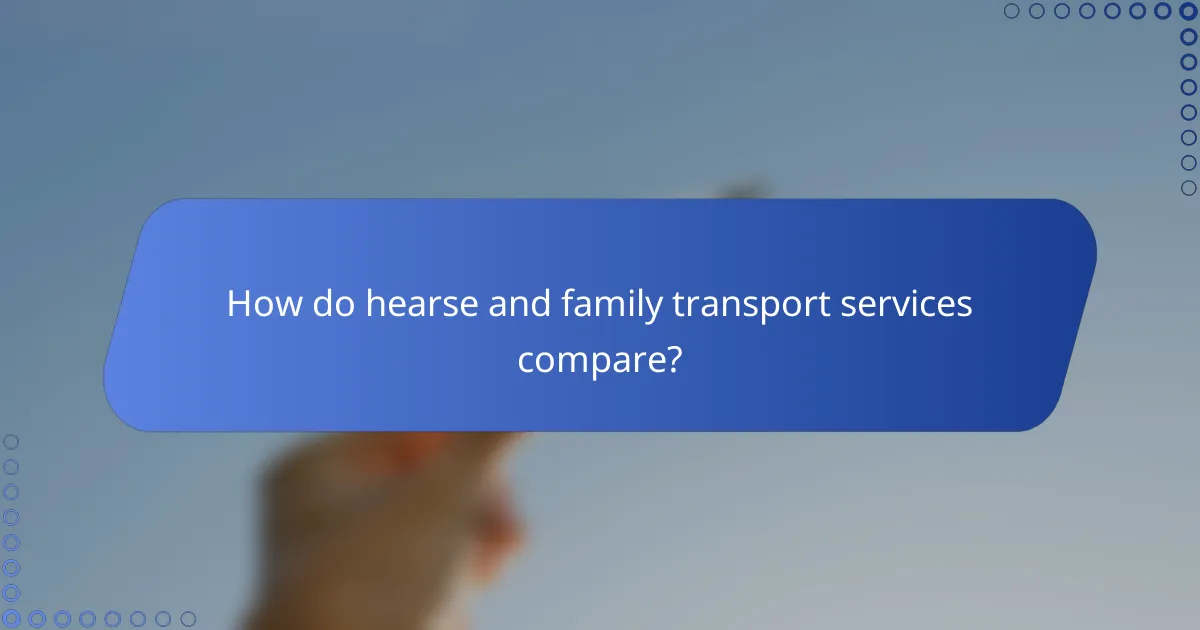
How do hearse and family transport services compare?
Hearse services and family transport options serve different purposes during a funeral, with distinct costs and service levels. Understanding these differences can help families make informed decisions that align with their needs and budget.
Cost comparison of hearse vs. family transport
The cost of hearse services typically ranges from a few hundred to over a thousand dollars, depending on the distance and type of service required. In contrast, family transport options, such as using personal vehicles or hiring a van, can be significantly less expensive, often costing only a fraction of hearse fees.
Families should consider additional costs associated with each option, such as fuel for personal vehicles or rental fees for larger transport. It’s advisable to obtain quotes from local funeral homes and transport services to compare prices effectively.
Service level differences
Hearse services are designed specifically for transporting the deceased, often including professional drivers and a dignified vehicle. This service typically ensures that the body is handled with care and arrives at the destination in a respectful manner.
Family transport, while more economical, may lack the same level of professionalism and comfort. Families using personal vehicles may need to coordinate logistics themselves, which can add stress during an already difficult time. It’s essential to weigh the importance of service quality against budget constraints when making a decision.
